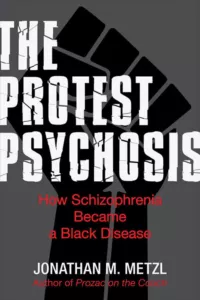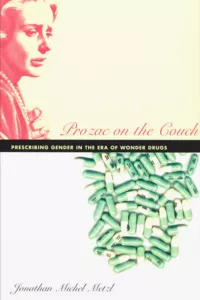Prozac on the Couch
Prescribing Gender in the Era of Wonder Drugs
Pills replaced the couch; neuroscience took the place of talk therapy; and as psychoanalysis faded from the scene, so did the castrating mothers and hysteric spinsters of Freudian theory. Or so the story goes. In Prozac on the Couch, psychiatrist Jonathan Michel Metzl boldly challenges recent psychiatric history, showing that there’s a lot of Dr. Freud encapsulated in late-twentieth-century psychotropic medications. Providing a cultural history of treatments for depression, anxiety, and other mental illnesses through a look at the professional and popular reception of three “wonder drugs” — Miltown, Valium, and Prozac — Metzl explains the surprising ways Freudian gender categories and popular gender roles have shaped understandings of these drugs.
Prozac on the Couch traces the notion of “pills for everyday worries” from the 1950s to the early twenty-first century, through psychiatric and medical journals, popular magazine articles, pharmaceutical advertisements, and popular autobiographical “Prozac narratives.” Metzl shows how clinical and popular talk about these medications often reproduces all the cultural and social baggage associated with psychoanalytic paradigms — whether in a 1956 Cosmopolitan article about research into tranquilizers to “cure” frigid women; a 1970s American Journal of Psychiatry ad introducing Jan, a lesbian who “needs” Valium to find a man; or Peter Kramer’s description of how his patient “Mrs. Prozac” meets her husband after beginning treatment.
Prozac on the Couch locates the origins of psychiatry’s “biological revolution” not in the Valiumania of the 1970s but in American popular culture of the 1950s. It was in the 1950s, Metzl points out, that traditional psychoanalysis had the most sway over the American imagination. As the number of Miltown prescriptions soared (reaching 35 million, or nearly one per second, in 1957), advertisements featuring uncertain brides and unfaithful wives miraculously cured by the “new” psychiatric medicines filled popular magazines. Metzl writes without nostalgia for the bygone days of Freudian psychoanalysis and without contempt for psychotropic drugs, which he himself regularly prescribes to his patients. What he urges is an increased self-awareness within the psychiatric community of the ways that Freudian ideas about gender are entangled in Prozac and each new generation of wonder drugs. He encourages, too, an understanding of how ideas about psychotropic medications have suffused popular culture and profoundly altered the relationship between doctors and patients.
Praise for Prozac on the Couch
”Prozac on the Couch combines a bold thesis regarding the persistence of Freudian categories of sexual difference amid the paradigm shift in psychiatry, documentation spanning professional and popular discourses, and lively, clear prose.”
— Mari Jo Buhle author of Feminism and Its Discontents: A Century of Struggle with Psychoanalysis
“Like its patients and practitioners, psychiatry does have its issues.… Jonathan Metzl looks at some of these issues in a mind-bending, literate way.… This book is extraordinarily researched and written in an engaging style that invites professionals and laypeople to open their minds to a broad and informed view of modern psychiatry and psychiatric drugs.”
— Ann Arbor News
“[Metzl] provides insight into the popular and professional responses to psychiatric treatments.…”
— On Campus with Women
“Metzl’s book helps give clarity to a highly charged subject. One of the book’s merits is Metzl’s command of both the science of medicine, pharmacy, and biology, and the tools of cultural studies. Able to handle the vocabulary of psychiatry’s critics as well as that of its proponents, he provides a refreshing voice in the debates about the merits and dangers of psychopharmacology.… Metzl’s written a smart and necessary book.”
— John Reuland, Bridge
“[A] plea for a truce between those who deal with the mind and those who study the brain.… [An] engrossing history of psychiatry over the past 50 years.…”
— The Economist
“Prozac on the Couch is a creative, intelligent, and provocative challenge to the notion that biologic psychiatry has replaced psychoanalysis as the dominant therapeutic model in psychiatry.… [A]n intriguing and challenging work standing at the intersection of medicine, history, culture, and ‘gender studies.’ … [F]or those who are looking for fresh perspectives, and who are willing to have their assumptions questioned, this book will be a real education and a pleasure to read.”
— Delese Wear, New England Journal of Medicine
“[F]ull of genuinely fascinating observations.… Prozac on the Couch is a thought-provoking and useful book.…”
— Lisa Jervis, Bitch
“Anyone who has been confronted by patients waving pharmaceutical advertisements or patients who think they need medication because they can’t get into Harvard will appreciate Prozac on the Couch. The book helps us remain aware that the ways in which we identify illness and functional impairment and treat patients are influenced by patients’ expectations and our own values, which are culture bound.”
— Martha L. Crowner, Psychiatric Services
“Prozac on the Couch has important things to say about the meaning of psychiatric practice.… Metzl tells an interesting story of how psychoanalysts defined psychiatric problems, and thereby opened a space for pharmaceuticals.”
— Elizabeth Bromley, Medscape General Medicine
“This is an important book for its contributions to understanding the complex connection between culture and science. By locating psychiatric history within a cultural framework, Metzl provides the reader with surprising, compelling, and rather unnerving insights into the nature of the pharmaceutical industry.… In an era where (philosophically divorced) objectivitiy in science is glorified and where the distance between science and capitalism is painfully thin, Metzl offers an analysis that is both enlightening and thought provoking.”
— Leeat Granek, Journal of the History of the Behavioral Sciences
“Jonathan Metzl’s book gains as much of its considerable intellectual clout from the very fact that the author himself is a practicing psychiatrist as it does from its excellent historical discussion and detailed documentation.… Nuanced, well written, and meticulously documented, it is the kind of book that reinvents the dialogue in a field, attracting thought and debate …”
— Suzanne White Junod, Pharmacy in History
“[I]nsightful.… [Metzl] has added a crucial dimension to the historiography of recent psychiatry and has artfully demonstrated the salience of gender theory for this field.”
— Nicholas Weiss, Journal of the History of Medicine and Allied Sciences
“Jonathan Metzl’s provocative book … takes on biological psychiatry’s master narrative … and persuasively, with wit and elegance, deals it a devastating blow.… Sparkling insights abound in Prozac on the Couch.… [A] delightful, challenging book that will be of great interest to historians of psychiatry and, more generally, to anyone interested in the intriguing gender politics of psychopharmacology.”
— Elizabeth Lunbeck, Isis
“This book’s insights extend beyond the cultural history of psychotropics to the powerful, contradictory appeal of academic cultural studies today. It suggests that cultural and biological turns can be made at the same time, and sometimes by the same people.”
— Ellen Herman, American Historical Review
“[W]ell-written and insightful.… [A] meaningful contribution to discussions of gender and mental health.”
— Adam Rafalovich, Social History of Medicine
“[A] complex and original cultural history of American biological psychiatry and psychotropic medications from 1955 – 2002.”
— Lynn Gorchov, Social History of Alcohol and Drugs
“Prozac on the Couch is a totally fresh and mind-altering work of medical history and cultural criticism that challenges us to think about psychiatric medications in ways that are both uncomfortable and inspiring: in other words, in ways that challenge us to change our points of view about what we swallow and why.”
— Lauren Slater, author of Prozac Diary
“Jonathan Michel Metzl’s book is an original and insightful exploration of the lively cultural meanings he locates in the spaces between the person, the psychotropic drug, the physician, and the neuroscientist.”
— Emily Martin, author of The Woman in the Body: A Cultural Analysis of Reproduction







